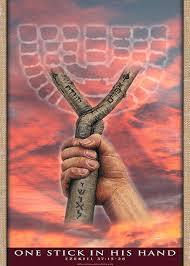The teaching that follows is a prophetic view of divorce (and remarriage) as presented in the Scriptures, nothing more or less. The reader may be thinking at this moment that the author in presenting this teaching is really “going out on a limb.” Perhaps so, but keep in mind that there are those who go out on a certain “limb” that is weak only to have it break off from under them, and then there are others who venture out on a different “limb” and what they say later proves to be accurate. The former are discredited, while the later are considered prophetic forerunners as they are helping to move the open-minded into the deeper areas of spiritual and Scriptural truth and into the deeper waters of the heart of YHVH Elohim. We will leave the reader to decide which this teaching is.
For the record, let it be stated at the outset that this teaching neither condones nor condemns divorce. This is the position of Scripture, by the way. It is not YHVH’s perfect will for divorce to occur, but sometimes reality dictates otherwise. Furthermore, in this paper we shall see that Scripture never presents divorce as a positive occurrence, but as something that is regrettable. Additionally, nothing in this paper should be viewed as advocating divorce. And finally, for the record, the author is happily married to his first and only wife and his best friend and partner in life. Divorce is not even a word in his marital vocabulary, by the grace of YHVH.
Yeshua Teaches on Divorce
While on this earth, Yeshua taught on many subjects pertaining to all areas of human existence—136 in all. He taught on everything from angels to worship, from money to taxes, sexuality to celibacy, fasting to food, joy to sorrow and yes, on the subject of divorce, as well. In Matthew 19:1-12 we read,
“And it came to pass, that when Yeshua had finished these sayings, he departed from Galilee, and came into the coasts of Judea beyond Jordan; and great multitudes followed him; and he healed them there. The Pharisees also came unto him, tempting him, and saying unto him, ‘Is it lawful for a man to put away his wife for every cause?’ And he answered and said unto them, ‘Have ye not read, that he which made them at the beginning made them male and female, and said, For this cause shall a man leave father and mother, and shall cleave to his wife: and they twain shall be one flesh? Wherefore they are no more twain, but one flesh. What therefore Elohim hath joined together, let not man put asunder.’ They say unto him, ‘Why did Moses then command to give a writing of divorcement, and to put her away?’ He saith unto them, ‘Moses because of the hardness of your hearts suffered you to put away your wives: but from the beginning it was not so. And I say unto you, Whosoever shall put away his wife, except it be for fornication, and shall marry another, committeth adultery: and whoso marrieth her which is put away doth commit adultery.’ His disciples say unto him, If the case of the man be so with his wife, it is not good to marry. But he said unto them, ‘All men cannot receive this saying, save they to whom it is given. For there are some eunuchs, which were so born from their mother’s womb: and there are some eunuchs, which were made eunuchs of men: and there be eunuchs, which have made themselves eunuchs for the kingdom of heaven’s sake. He that is able to receive it, let him receive it.’”
The prophet Malachi says that YHVH hates putting away, a Hebraism for divorce (Mal. 2:16). Yet Yeshua says above that in the Torah (the Books of the Law) divorce was permitted if one of the parties had a hardened heart resulting in irreconcilable differences. Adultery was cause for divorce if the offending party refused to repent, but Yeshua, by implication, does not seem to limit divorce for reason of adultery only.
YHVH’s Marriage to Israel: An Historical Overview
YHVH Marries the Nation of Israel
The Hebrew Scriptures are the history of YHVH choosing a spiritual virgin bride from among the nations of the world, preparing that bride for marriage and then entering into a spiritual, marital and covenantal relationship with that bride. That bride was the nation of Israel whom YHVH married at Mount Sinai. The Torah-law was the marriage agreement (See my teaching where the Jewish wedding is outlined historically and prophetically in a biblical context available on our web site and entitled, The Bible: A Love Story—The Story of Two Lovers—How YHVH’s Set-apart Feast Days Are the Outline of that Love Story: A Plan of Redemption). Ezekiel describes the marriage between YHVH and Israel succinctly as follows:
“And when I passed by thee, and saw thee polluted in thine own blood, I said unto thee when thou wast in thy blood, Live; yea, I said unto thee when thou wast in thy blood, Live. I have caused thee to multiply as the bud of the field, and thou hast increased and waxen great, and thou art come to excellent ornaments: thy breasts are fashioned, and thine hair is grown, whereas thou wast naked and bare. Now when I passed by thee, and looked upon thee, behold, thy time was the time of love; and I spread my skirt [kanaph which is the corner of a talit] over thee, and covered thy nakedness: yea, I swore unto thee, and entered into a covenant [i.e., a marriage covenant or ketubah] with thee, saith the YHVH Elohim, and thou becamest mine” (Ezek. 16:6-8; read verses 1-43 for context).
One Nation (Wife) Becomes Two Nations or Houses
Now at the foot of Mount Sinai YHVH married one (spiritual) woman comprised of several million Israelites who were descendants of Abraham, Isaac and Jacob comprising of 12 tribes. Those 12 tribes remained as a single national entity for 500 years until the death of King David’s son, Solomon. When Solomon’s son Rehoboam became king over the nation of Israel the northern ten tribes of Israel revolted against Rehoboam and under the leadership of Jeroboam seceded from Israel and formed a separate nation whose capital was Samaria. In countless places Scripture refers to this nation as the House of Israel, or Ephraim, named after the largest and most prominent tribe of the Northern Kingdom.
Those Israelite tribes which remained loyal to Rehoboam were named the house of Judah after the most prominent tribe of the Southern Kingdom.
Whereas YHVH had married the nation of Israel at Mount Sinai, 500 years later that nation split into two. It was still the nation of Israel, but it was like a woman with a split personality who acts like two people. Indeed… (to continue reading this article, go to http://www.hoshanarabbah.org/pdfs/divorce.pdf)




